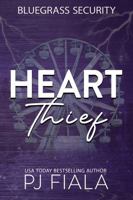Moving to Desire: A steamy, small-town romantic suspense story
Select Format
Select Condition 
Based on Your Recent Browsing
Book Overview
Rolling Thunder - where bikes are built, family bonds are strengthened and love ignites.
He's been trying to overcome his past,
She's been running from hers,
Together they must face the past that threatens to destroy them.
Gunnar Sheppard's father left him and his mom when he was only a month old. Now that his mom has married, he has a whole new family in his life, including two biological half-sisters, and he's hoping his heritage of a cheating, no-good father and a box of pictures his stepmother gave him can be put to rest. That's where the problems begin.
Emma Drake has gone through some hard times. She's been stalked, cheated on, and fired. Returning home to her sister is both a balm and a burden. Her history with bikers isn't stellar and when she meets Gunnar, the sizzling, sexy biker in the parking lot, she's more than a bit unsure of him.
Gunnar and Emma recognize the spark between them instantly, but both have battles to fight that could harm the other. They need to find a way to keep the growing attraction strong and battle the events that keep forcing their way between them. Both are determined to rid themselves of the ugliness of the past. But finding a way to do that and not harm the other in the process seems too much to handle.
---
Entire series complete!
USA Today bestselling author PJ Fiala brings you the full and complete Rolling Thunder series-heroes willing to sacrifice everything for the women they love. Full length novel with no cliffhanger, no cheating, and a happily-ever-after guaranteed.
This book was previously published in a different size. Please check your library before purchase.Customer Reviews
Germinal Mentions in Our Blog














































